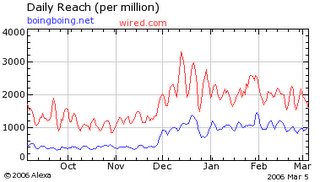Scott Karp
posted yesterday (a Sunday, mind you) about a number of things around the notion of blogs being conversations. In particular, he writes:
I’ve been involved in many thought-provoking conversations, most of which seem to peter out right when they started to get interesting. That’s the way the ever-rushing, every-churning blogosphere works. There’s always new news to read and new posts to write.
This is an important point about not only blogs, but how technology influences our notion of news: the frequency of publishing dictates our expectations of novelty. The technology that allowed for the daily publication and delivery of news in paper form changed expectations: you would assume that something worth printing happens at least once every 24 hours. Television, radio and the Internet decrease the time to publish, thereby increasing the expectation of news.
Blogs take it to the extreme. With no editorial overhead, the distance between thought, analysis and reporting is shrunk down to near zero. Readers expect a new story with every click of the refresh button. Is it any wonder that the most visited are also the most prolific?
The trouble, of course, is that world events don't necessarily conform to publishing technology needs. The pipe must be filled, however, and so there is an increased need to push more content out, ultimately resulting in a sort of info-overload. Consider the flow of announcements of new technologies and Web2.0 start ups. Can anyone really keep them straight? Or differentiate between them all?
I certainly haven't got the answer. It's a bit of a "Jane-stop-this-crazy-thing" moment. I will say, however, that this situation is best helped by context: the placing of new info nuggets into an understood environment. The best bloggers are doing this already, either through the continued use of tags or by simply writing in a way that isn't simply filling the pipe, but helping you to understand.
Consider TechCrunch, the blog that has given itself the formidable task of "tracking Web 2.0". This morning,
there's a post about something called SnapTune. Michael Arrington does a great job describing the service by connecting it not only to another startup (Pandora), but also by associating with a very familiar task: recording radio to cassettes.
Immediately, this new piece of content is not only delivered, but delivered in a way that makes sense and tells me how to think about it. If bloggers are going to be new journalists, they are going to have to play by new rules. The notion of openness and transparency has been pretty well covered. The issue of effectively communicating in a torrent of content has not.






 Automotive News
Automotive News 






